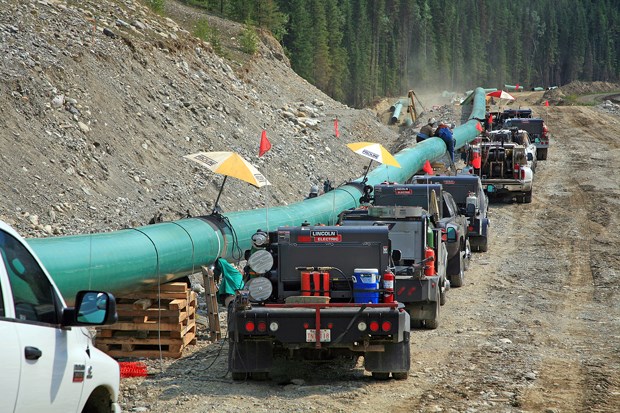The proposed twinning of the Trans Mountain Pipeline could put decades of work to restore the Brunette River at risk.
That was one of the arguments made by a delegation of city representatives who appeared before the National Energy Board, which was holding final arguments for intervenors in Burnaby on Tuesday. Kinder Morgan is seeking to twin the Trans Mountain pipeline that runs oil from Alberta to the B.C. coast, which would increase shipping volume from 300,000 barrels of oil per day to 890,000.
Mark Allison, manager of strategic issues and sustainability, said the City of New Westminster has “significant concerns” about the proposed twinning of the Trans Mountain Pipeline. Concerns put forward by New Westminster include: the potential impacts the project would have on the local environment, including soil, water and local flora and fauna; the ability for first responders to respond to incidents with the pipeline; the appropriateness of the route being considered; the potential impact of the project on landowners and land use; and safety and security during construction and operation of the project and contingency planning of spills.
Fire Chief Tim Armstrong said emergency responders have a “critical need” to develop successful emergency response plans so they can respond to emergencies, but Kinder Morgan only released a heavily redacted version of its response plan, citing security reasons.
“The emergency response plan provided is more like an emergency remediation plan,” he said. “It is after the fact.”
Armstrong, president of the Metro Vancouver Fire Chiefs Association, has “great concerns” about the lack of consultation and engagement regionally. He said there needs to be a collaborative process to work with emergency responders to develop a strong response plan if this pipeline is to proceed.
James (Brett) Allen, an ecosystem planner with Diamond Head Consulting, said the proposal puts all the work done on the Brunette River at risk and suggested Kinder Morgan has done “very little work” to investigate the effects a spill would have on the river.
Longtime New Westminster resident Elmer Rudolph gave the board a condensed history lesson on the Brunette River, noting there was an abundance of fish in the river in the early 1900s, but industry later "crippled" the salmon run and no salmon were found in 1955. Once a "dead river," the Sapperton Fish and Game Club nurtured the waterway and Coho returned to the river by the mid-1980s.
"We are very protective of it," he said. "We don't want to lose it again."
Rudolph said an oil spill from the pipeline could be "catastrophic" for the Brunette. When organizations expressed concern to Kinder Morgan about the potential for a spill, he said the company's response was that it could use thicker pipes for the pipeline.
"That's a response we might have expected in 1969, but not in 2016," he said. "That was very disconcerting to us."
Allison outlined some of the city's key concerns about the pipeline proposal, including:
* Kinder Morgan hasn't provided a clear rationale for moving the pipeline to the route currently being proposed, which is within several kilometres of the ecologically sensitive Brunette River.
* The Brunette River contains a number of species at risk, including the Nooksack Dace, which is endangered and found in only one other ecosystem in the world.
* It isn't clear if the proposed pipeline construction techniques in the Lower Brunette River floodplain would withstand a rupture from human or seismic disruptions in an area subject to liquefaction in an earthquake.
* Local fire and rescue services haven't been given information needed to determine if they can adequately protect the city and its residents in the event of an emergency resulting from pipeline construction or operations.



